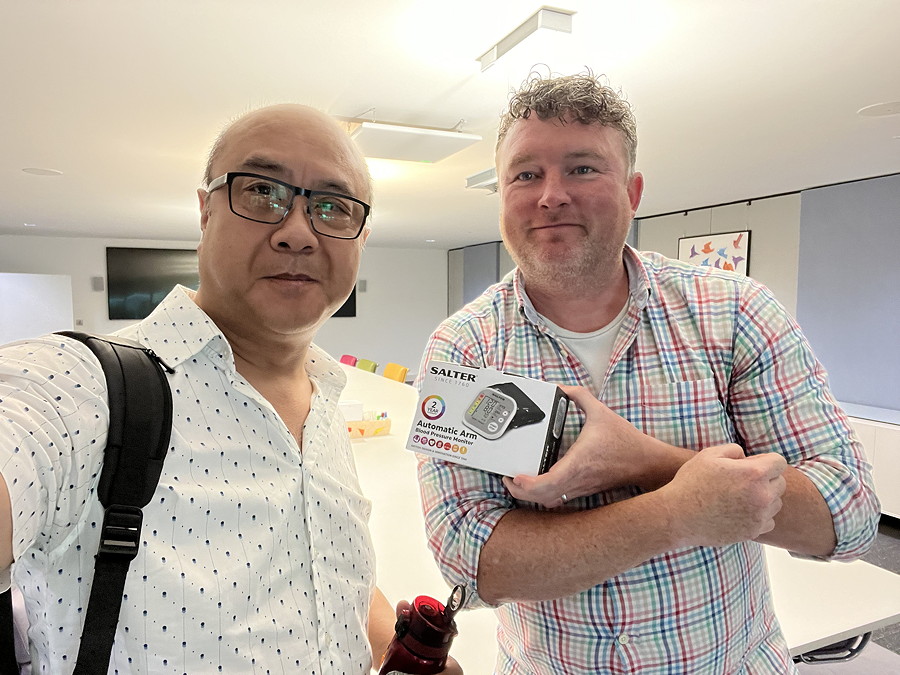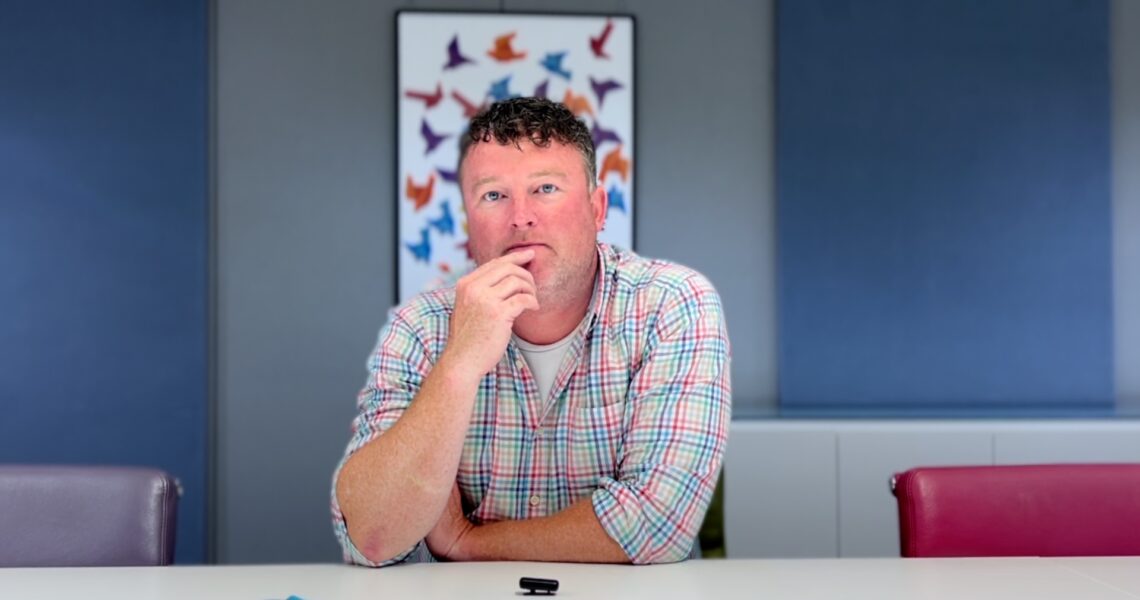Andrew Roughan – CEO Plexal, orchestrating innovation outcomes
This was a slightly different interview in that I wasn’t interviewing one innovation centre, one manager of that place, I was speaking to Andrew Roughan, the CEO of Plexal. Plexal is a company that manages many innovation centres and co-working spaces around the UK, such as in London, Manchester and Cheltenham.
In rewatching the video to summarise, I know he gave so much information and was very transparent and generous, and I want to give him a huge thank you for that.
Andrew gave a much more strategic view about the role of innovation spaces in terms of regional outcomes and the national agenda. He also explains how Plexal “orchestrates” the many components at play, in not just bringing the business support, but the right level for each business at different stages of their journey.
His answer to my question about how London compares to the rest of the country surprised me too, but on reflecting what I see in Dorset, I could see exactly what he meant.
Plexal is now 7 years old, nearly 100 people and turnover of £20m with a mindset to scale that much further. I have no doubt under Andrew’s leadership, they will succeed.
You are way better off listening to Andrew’s own words first hand on the YouTube video below.
Executive Summary
My words doesn’t do the interview justice, but given below for the needs of the Blog.
- Provides co-working spaces but bulk of work is from their consulting and programme delivery.
- Serendipity is more curated now to intentionally bring people together
- Plexal spaces are open to all. No application process to fit a specific theme.
- Plexal works hard at bring the right support, on a one to one basis, to help an organisation grow
- Being mission led is so important for clarity. For local outcomes.
- Have expanded to an initiative in Singapore, which should be the start of many more.

The wider role of Plexal
Plexal does three things
- Manage places for innovators, providing the infrastructure for collaboration.
- Innovation consulting, delivering programmes of work that focus on UK Government science and technology policy agendas, that drive change and outcomes.
- Build innovation clusters, helping local government drive economic growth.
What sites are Plexal involved in?
Currently 6 facilities around the UK.
2 in London, in Stratford and Shoreditch.
3 in Cheltenham, at Gloucestershire College, Minster Exchange (* Gordon has already visited Hub8 MX – interview) and another one run for Government.
DiSH (Digital Security Hub) in Manchester, a partnership between Barclays Eagle Labs and Plexal.
How important is it working with local government for region development?
Increasingly important, because of the government’s talk of the growth agenda, along with devolution, decision making and economic power to local people.
This can lead to more capital being made available to invest, by local government, into infrastructure that will provide growth, but what would be missing would be the operating system to make it happen.
Plexal augments local government to help them form a strategy to drive growth and prosperity, as well as helping them implement it.
Aside from the rooms and workspace, what is the Plexal innovation magic?
Plexal sees itself at the orchestrator that sits in between everyone, to understand what they need and to serve up what they need at the time of collaboration.
An example is with startups and investors, where rather than having a series of draining pitch days, it’s better to introduce on a one-to-one basis when the time is right.
The role of serendipity in innovation
There is Serendipity v1.0 (pre-Covid) and Serendipity v2.0 (post-Covid).
Pre-Covid it was about getting people together, creating a meet-up culture around topics of interest and intrigue, creating diverse communities. Innovation spaces were assumed to create those conditions for it to happen organically, through programming a series of events.
Post-Covid, there’s no guarantee that people will be around in those spaces, and innovation space management have to work harder at creating reasons for people to come to the place.
There might be less instances of engagements now, but higher quality. Serendipity now is more intentional, less frequent, but can be measured because of the aim to create it.
Do you curate a theme for the range of tenants or open it up to all?
We would never call them tenants. The legal connotation between a landlord and a tenant are very different to a customer and a supplier. We very much see this as a partnership. We are all members of this community.
We want to be open. We don’t have an application process. We do however run applications to be on our programmes because of the subject matters and challenges, and that they are appropriate.
In our physical spaces we want to encourage very open access, diversity of thought, different types of organisations coming together.
Could businesses share their failures to help others?
Plexal are involve in areas of the economy on four perspectives.
- Product – where the startup lives
- Customers – do they desire it and it is built as needed
- Skills – does the producer and customer have the skills
- Capital – to make it all work and scale
Plexal looks for innovation opportunities in these areas and that process can identify failure easily.
All too often those four things don’t exist together, and the only recent example was the Fintech revolution that came with deregulation. This isn’t easy to come about in other domains and sectors.
There is a need for an organisation that can reach in to find the missing components and bring them together. This is very much so in Plexal’s work with local government, to find out what is around their area and what they have available to them.
We caution against an approach that over concentrates oo startups and a drive to only have a thriving startup economy.
Are you happy when people outgrow you?
Delighted.
About 75% of our revenues come from consulting. Whilst the buildings and real estate of Plexal might seem large, it is not the majority of our business model.
Hopefully those that outgrow Plexal will stay local and build a different relationship again. There is an alumni too.
How different is the London vibe compared to the rest of the country?
London has more energy and more disconnect.
London is a global city, with that positive energy. Global skills, global talent and capital markets readily available and customers on your doorstep.
The disconnect is that it is a global city, it is massive. There are enclaves all over the place. The overlap doesn’t work particularly well, and everyone is happy working in their silos.
It’s not a particularly welcoming open environment, because of the size of it and there’s limited motivation for the actors to make that open environment work.
When I go around other innovation ecosystems around the UK, there are individual actors, a handful of people, who are the key people there that can make things happen. They can get people together, to follow them and are the leaders there. London is too big to have those characteristics.
If I take Manchester as an example, there is much more connection, much more pride of place. Much more local authenticity, similar to the Cheltenham environment in a different way.
What Manchester gains in its connection can cause pace and progress that maybe exceeds what could go on in London, despite the lack of capital and the lack of customer.
London with its availability of capital and availability of customer can stimulate progress in a different way without the connection.
What should the return be from innovation centres?
Mission was very important in creating Plexal (in Stratford) and it was easy to align with the Government legacy of the 2012 Olympics. That gave us a really clear goal that it’s about social regeneration. That doesn’t mean people cannot make money along the way and we can’t cause global outcomes, but we have to remember this is about hyper local impact.
That clarity of mission gave more social purpose and community engagement. Much more focus on medium and long term prosperity outcomes. Rather than talking about case study examples, we can talk about statistics of the last 10, 20, 30 years.
From this, I am looking at what the next noble mission is. That’s why we have anchored on Government led innovation, where Plexal can help UK Government further its global leadership position in certain technology domains, whilst at the same time causing progress in the UK by stimulating its economy. This gives us the higher order goal rather than worrying about P&L every year (which we have to do anyway as a private business), we are focussed on a more noble, more engaging, more altruistic outcome that underlines our neutrality and openness to engage with everyone.
When it comes to other innovation centres, the ones that work globally, it’s about the alignment of public interest and private interest, not separating the two.
Private sector innovation centres that have no public goal or purpose are often very focussed on a financial return, and design a business accordingly.
Public sector innovation centres with have the design of it to citizen outcome or a policy achievement, but potentially not sustainable. It won’t gain funding medium term, so it can progress but then it stops.
It’s the alignment of those two worlds where the best of breed emerges. You then get the purpose-led policy outcome, as well as getting an economic return for the stakeholders.
Having hosted the likes of Rishi Sunak as PM to Plexal sites, do you have a responsibility to lobby and represent your cohorts?
We’ve hosted Rishi Sunak twice, once as chancellor and once as prime minister. We’ve also hosted Kier Starmer, Tony Blair, and Teresa May.
Our role isn’t to lobby. Our role is to be the gateway. To understand the needs of the startup, industry, academia and understand the needs of government, and act as this mediator that can speak in a language that can appeal to all of those groups and seeks to find the common ground for progress to happen.
Want to be specific that we are not lobbying as we are not on any particular side, but to find that common ground where collaboration and change can happen.
Plexal is now in Singapore. Are you going global?
We’ve worked in the global markets for some time but Singapore is probably the most overt so far. It is a partnership crafted with the national university of Singapore and the cyber security agency of the Singaporean government.
That came from a series of engagements on innovation activity around cyber security in the UK, and how that could be evolved into the needs of the Singaporean government and to create an experimentation capability to not only stimulate the local cyber capability, but to draw other organisations that could come to Singapore.
This should be the first of several initiatives to follow.
Who should be coming to Plexal?
Everyone. We are very open and would like to engage with all organisations. It could start from getting a desk and being part of the community and seeing the innovation aspects.
For our innovation programmes, we are on the hunt for the best tech companies in the UK and beyond, that can help solve government problems and industry problems. From doing this for seven years we have built an alumni network of interesting organisations and can be called up for these problems. It’s about creating opportunities for those organisations.
If the people reading this have a tech company that they believe meet the strategic aims of UK government, they should get in touch with Plexal so you can be on the radar, and can be thought about when engaging with specific government departments, on those opportunities and private sector opportunities.
